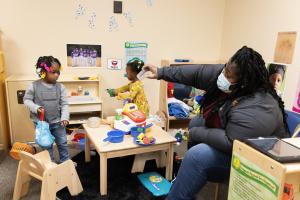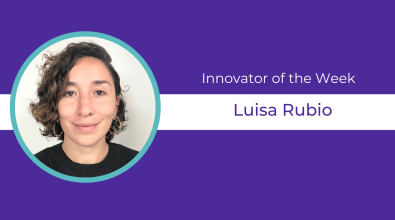This early-education approach has cities everywhere talking

Birmingham Talks served 1,500 children in its first three years, and saw the greatest gains in interactive talk in children who started in 'low-talk' environments. (photo: Cary Norton)
Four years ago, local leaders in Birmingham, Ala., set out to borrow and build upon a proven and successful program related to early-childhood development from Providence, R.I.
The program, Providence Talks, was a grand prize winner in the 2013 Bloomberg Philanthropies Mayors Challenge. It aids language development in children from birth to age 3, using devices that count the number of words and conversational turns children hear in a day, as well as coaching for parents and caregivers to speak more around the children. That’s something research shows is critical to children’s vocabulary building, brain development, and school readiness. A Brown University study showed positive results among participating children.
Birmingham’s version, Birmingham Talks, served 1,500 children in its first three years, and saw the greatest gains for children who started out in "low-talk" environments. Now, city leaders are ready to take the program to new heights. By 2025, their goal is for half of all children starting public kindergarten to have benefited from the program. Last October, city leaders committed $1 million to this expansion, Birmingham’s largest-ever investment in early childhood education.
“This large investment is a no-brainer, because it has a tenfold return on making sure children enter school at grade level,” Mayor Randall Woodfin tells Bloomberg Cities. “The foundation of education is birth to 5 years of age.”
Birmingham is one of dozens of communities that have borrowed, adapted, and built on Providence Talks, using one or more service models tested in the Rhode Island city. One of those models coaches parents and caregivers individually at home; a second coaches groups of adults together while the children play; and a third trains workers in childcare centers.
According to LENA, a nonprofit that provides the underlying technology and curriculum these programs rely on, the idea has spread to more than 100 communities and reached more than 60,000 children, parents, and teachers—and interest continues to build.
‘The need is great’
This growth is happening at a critical time, when the COVID-19 pandemic has caused troubling learning losses for children of all ages, including the very youngest. According to a LENA analysis, children born nine months into the pandemic experienced significantly less talk than those born before, pointing to a high risk they will experience language delays.
“We’ve been socially isolated from one another, staying home, working from home, and interactions are down,” says Steve Hannon, President and CEO of LENA. “The need is great, and the opportunity to make quality investments now is high.”
[Read: New evidence helps more cities adopt Providence Talks model]
Those investments are coming from a number of directions. Bloomberg Philanthropies supported new programs in five cities, including the one in Birmingham as well as in Detroit, Hartford, Conn., Louisville, Ky., and Virginia Beach, Va., with seed funding that has helped pull in additional funders.
Other programs are driven by local or state governments, school districts, Head Start centers, libraries, nonprofits, and other partners. In an exciting new development, statewide programs are now underway in Ohio and Tennessee, led by organizations in those states that support quality childcare.
In Tennessee, about 150 childcare educators have just started training, as part of a broader curriculum on promoting language development and literacy in children. Another 150 educators will start in April. According to Heather Hicks, Director of the Tennessee Child Care Resource & Referral Network, which is funded by the state Department of Human Services to provide the training, "It just goes hand-in-hand with everything we're doing to build strong brains and recognize the importance of talk."
One upside of these programs is that they are very scalable. The word-counting devices are reusable, and the curriculum takes just a couple of months to complete.
"It's something you can administer and get to big numbers and scale within a year," says Results for America's Brittany Giroux Lane, who oversaw the rollouts in Birmingham and other cities supported by Bloomberg Philanthropies. "And because you have strong data driving the program, you're able to visualize progress."
Adapting to local circumstances
In Birmingham, Ruth Ann Moss shares that view. A former school teacher, Moss worked with a local philanthropy called the Overton Project, the city of Birmingham, and Bloomberg Philanthropies to launch Birmingham Talks as a nonprofit in 2019.
“Birmingham Talks is based on the idea that children deserve the very best from the very beginning,” she says. “We’ve learned so much from the work in Providence and other folks across the country on ways cities are delivering on that promise.”
In borrowing the idea from Providence, Moss says, Birmingham “kind of riffed on it,” tweaking it to the local context in ways that enabled momentum to build. The pandemic also was a big factor.
For example, Birmingham started out with a big bet on home visiting for individual parents and caregivers, something that was core to the original Providence Talks model. While they tried moving this one-on-one coaching online, Moss says, “we just were not having the kind of uptake and impact we wanted to see.”
[Check out more proven solutions your city can take advantage of]
Over time, Birmingham Talks pivoted toward more scalable models built around group coaching and childcare workers.
In the groups, as many as 20 parents gather weekly for eight to 12 weeks. They review data reports on how many words and conversational turns their children are hearing. Facilitators also lead fun sessions on different topics, such as the language of food and opportunities to talk with children about cooking and eating. Coming out of the pandemic, parents have found the social connections they build through these group sessions to be a valuable side benefit.
In the childcare model, teachers get one-on-one coaching in 30-minute sessions, typically during the kids’ naptime. They go over the data reports and set talk goals so that the children are hearing the number of words and conversational turns needed for brain development. Coaching for one teacher benefits anywhere between six and 18 children they’re interacting with on a typical day, and continues to pay dividends as new children cycle into their classrooms.
As Birmingham looks to expand these programs, Moss can point to strong evidence that they work. “One thing that’s wonderful about working with Bloomberg and other national partners, and working with national entities like LENA, is that this model has been proven in so many parts of the country.” A local evaluation showed a roughly 50-percent gain in interactive talk with children who start out in lower talk environments.
Results like these are a big reason why the city of Birmingham doubled down on the program. And it’s what gives Moss hope that the impact can scale up in a big way.
“What I spend a lot of time thinking about is how do we transition this from something that’s having an effect on individuals to something that’s having an effect on systems,” Moss says. “This is about moving toward a world where, when people bring their newborn children home from the hospital, they don’t have to wonder if they’re going to grow up and learn how to read one day. We want that to be true for every single child in our community.”



